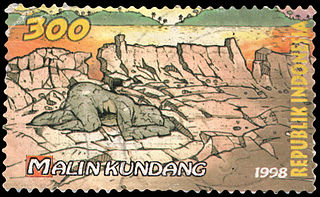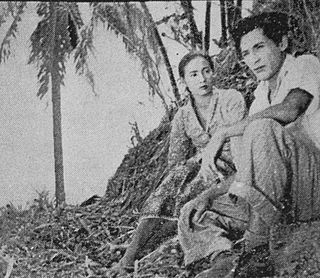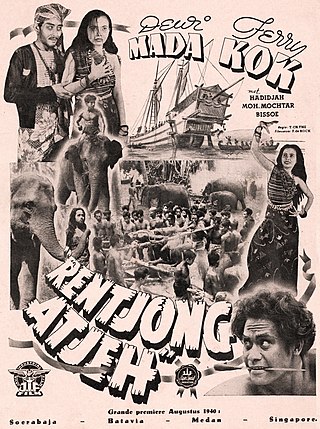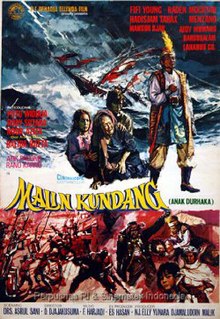
Malin Kundang is a popular folktale in Indonesian folklore that originated in the province of West Sumatra. The folktale tells of an ungrateful son named Malin Kundang and centers around the themes of disobedience and retribution that turned him into stone. Aside from this folktale, there are several other similar variations across South East Asia including Si Tanggang and Nakhoda Manis that originated in Malaysia and Brunei.

Embun is a 1952 film directed by D. Djajakusuma for Perfini in his directorial debut.

Rano Karno is an Indonesian actor and politician who served as Governor of Banten from 2014 to 2017. As a result of his fame gained from his acting career, he is known for starring in the 1979 film Gita Cinta dari SMA.

Sjumandjaja was an Indonesian director, screenwriter, and actor. During his career he wrote numerous films, directed fourteen, acted in ten, and produced nine; he also won five Citra Awards from the Indonesian Film Festival. His films reflected social realism.

Lewat Djam Malam is a 1954 Indonesian film directed and produced by Usmar Ismail and written by Asrul Sani. Widely regarded as a classic of Indonesian cinema, the film follows an ex-soldier in his vigilante actions against corruption.

Djadoeg Djajakusuma was an Indonesian film director and promoter of traditional art forms. Born to a nobleman and his wife in Temanggung, Central Java, Djajakusuma became interested in the arts at a young age, choosing to pursue a career in theatre. During the Japanese occupation from 1943 to 1945 he was a translator and actor, and in the four-year national revolution which followed he worked for the military's educational division, several news agencies, and in drama.

Fifi Young was an Indonesian actress of mixed French and Chinese descent who acted in at least 86 films over her 34-year career.

Tjambuk Api is a 1958 Indonesian martial arts film directed by D. Djajakusuma and produced by Usmar Ismail. Starring Bambang Irawan, Aminah Cendrakasih, Soekarno M. Noer, and Rendra Karno, it tells of a young villager who must challenge a local criminal to be with his love. The film underwent several modifications over a period of more than a year before it could pass the censorship board, but now remains one of Djajakusuma's better known works.

Rentjong Atjeh is a 1940 action film from the Dutch East Indies directed by The Teng Chun. Telling of a group who take revenge against pirates in the Strait of Malacca, it starred Ferry Kock, Dewi Mada, Bissoe, Mohammad Mochtar, and Hadidjah. It was filmed near the shore in Batavia and reused footage from The's earlier work Alang-Alang (1939). Rentjong Atjeh, inspired in part by the Tarzan films, was a commercial success, although it may now be lost.

Budak Nafsu is a 1983 Indonesian film directed by Sjumandjaja and adapted from the 1981 novel Fatima by Titie Said. Starring Jenny Rachman and El Manik, it follows a mother who is forced to serve as a comfort woman for Japanese men stationed in British Malaya in an effort to save her daughter. The film was a commercial success, although critics have emphasised its sexual aspects.
Salah Asuhan is a 1972 film directed by Asrul Sani, produced by Andy Azhar, and starring Dicky Zulkarnaen, Ruth Pelupessy, and Rima Melati. Adapted from Abdoel Moeis' 1928 novel of the same name, it tells of a man who betrays his upbringing for the metropolitan life, while at the same time marrying an Indo woman instead of the one chosen by his mother.

Air Mata Iboe is a 1941 drama film from the Dutch East Indies directed and written by Njoo Cheong Seng. Starring Fifi Young, Rd Ismail, Ali Sarosa, and Ali Joego, it followed a mother who raises her children lovingly but is ultimately betrayed by her eldest sons when she falls upon hard times. The film, billed as a "musical extravaganza," featured a soundtrack by R. Koesbini, and an eponymous title song written by Njoo.

Srigala Item is a 1941 film from the Dutch East Indies that was directed by Tan Tjoei Hock and produced by The Teng Chun for Action Film. Starring Hadidjah, Mohamad Mochtar, and Tan Tjeng Bok, the film's plot – inspired by Zorro – follows a young man who became a masked vigilante to take revenge against his conniving uncle. Srigala Item was a commercial success, which Misbach Yusa Biran credits to the plot's use for escapism. A copy of the black-and-white film, which featured kroncong music, is stored at Sinematek Indonesia.
Elang Darat is a 1941 film from the Dutch East Indies which was directed by Inoe Perbatasari and produced by The Teng Chun for Jacatra Film. A detective film, it follows a man who comes to a village to track the villainous bandit known only as "Elang Darat".

Tjioeng Wanara is a 1941 film from the Dutch East Indies directed and produced by Jo Eng Sek. Starring R Sukran, Elly Joenara and AB Djoenaedi, it featured more than 500 people in supporting roles. The film follows a young prince named Tjioeng Wanara who must reclaim his throne from the cruel King of Galuh; it is adapted from the Sundanese legend of the same name.

Elly Joenara was an Indonesian film actress who later became a producer. She was the wife of producer Djamaluddin Malik.

Union Films was a film production company located in Batavia, Dutch East Indies. Established by ethnic Chinese businessmen Ang Hock Liem and Tjoa Ma Tjoen in 1940, it produced seven black-and-white films before it was dissolved in 1942; all are thought to be lost. The company's films were directed by four men, mostly ethnic Chinese, and launched the careers of actors such as Rendra Karno and Djoewariah.

Darussalam was an Indonesian actor who appeared in more than seventy films in his forty-year career. Born in Bengkulu, he studied to be nurse before migrating to theatre during the Japanese occupation of the Dutch East Indies, marrying Netty Herawaty while with the troupe Irama Masa. The couple spent the remainder of the occupation and the ensuing revolution touring the archipelago with a number of troupes. In 1949, Darussalam and Herawaty made their feature film debut in Fred Young's Saputangan, appearing in seven further Young productions before migrating to Djamaluddin Malik's Persari. During their eight years with the company, Darussalam and Herawaty travelled to the Philippines and Singapore and found popularity among audiences, though Darussalam remained in his wife's shadow.

Tiga Dara is a 1957 Indonesian musical drama film starring Chitra Dewi, Mieke Wijaya, and Indriati Iskak. Directed by Usmar Ismail for Perfini, the film follows three sisters who live with their father and grandmother. When the eldest sister, Nunung, shows no interest in marrying, her family tries unsuccessfully to find a husband for her. Nunung initially rejects the advances of a young man named Toto, who instead dates her younger sister. However, when he becomes jealous and travels from Jakarta to Bandung to profess his love, she agrees to marry him.

Farouk Achmad, often credited as Farouk Afero, was a British India-born Indonesian film actor. After making his feature film debut in 1964, he rose to fame in 1970 with Bernafas dalam Lumpur. Afero ultimately appeared in more than sixty films.


















